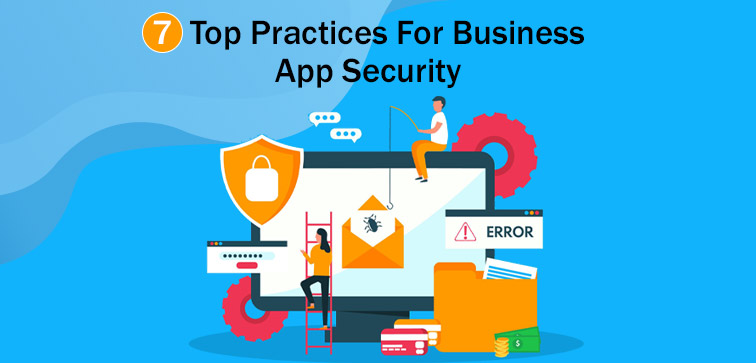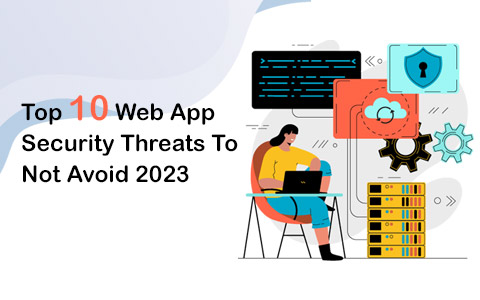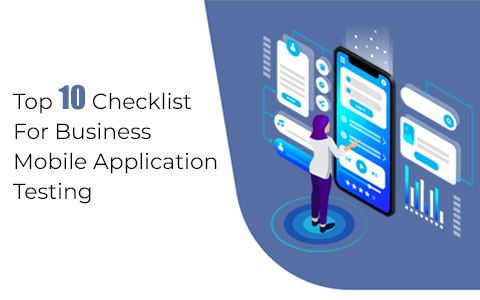7 Top Practices For Business App Security
 September 22, 2023
September 22, 2023 Mobile Apps Mobile Apps Development Mobile Web Development Services Web Application Development Services Web Apps
Mobile Apps Mobile Apps Development Mobile Web Development Services Web Application Development Services Web Apps
“A secure web application today is a competitive advantage tomorrow.” – Paul Pucillo

In our previous blog post, we explored the foremost security threats that web applications may encounter. In today’s blog, we will delve into essential best practices that must be diligently observed and adhered to in order to maintain robust application security at all times!
Business applications and websites require periodic updates and enhancements to keep pace with advancing technology. If you are in search of a dependable partner for web solutions, your search concludes here.
Midas offers cutting-edge Web Development Services, complemented by exceptional software testing, web application design, and optimization solutions. Feel free to contact us for further information.
Web App Security And Significance:
Ever since the introduction of dynamic websites the user interactions have improved and increased. On one hand, it contributes to visitor engagement, users can sign up for the site and app and get a better user experience on the application.
However, it also includes sharing of personal information when signing in or during the payment process, etc. This heightened interactivity also presents an enduring challenge, meaning a security threat.
The huge digital landscape also includes the web app security, which is a sub-category of information security. Web app security basically focuses on the comprehensive set of measures that can be adopted to safeguard web apps from malicious codes and other cyber threats. Secure web applications offer a range of tangible benefits such as preventing revenue loss, enhancing reputation and trust (bolstering the company’s reputation), and ensuring regulatory compliance with established security standards.
Effective Strategies For Web App Security:
1. Thorough Security Audits:
Regular security audits are recommended to proactively identify potential vulnerabilities within systems.
These audits serve the dual purpose of safeguarding web applications against targeted attacks and ensuring adherence to predefined security protocols.
If conducting security audits in-house is not within your organization’s expertise, or if you seek impartial evaluations, you can hire a third-party testing team.
Such teams collaborate closely with Development Teams and offer various Types of Security Audits, including:
Black box security testing, gray box security testing, white box security testing, penetration testing, Static Application Security Testing (SAST), and Dynamic Application Security Testing (DAST).
2. Ensuring Robust Data Encryption:
Ensuring the encryption of user data is imperative, both during its transmission between the user’s browser and the server and while it remains at rest. In 2021, statistics from BuiltWith revealed that 68.61% of websites with significant traffic implemented SSL/TLS encryption.
This cryptographic protocol serves to encrypt and secure all data exchanged between a visitor’s application and your system. To achieve robust encryption, your web application can leverage SSL certificates like RapidSSL, Thawte SSL, and GlobalSign SSL, among others, which are readily available through reputable resellers at competitive rates.
Moreover, your organization should adhere to established encryption standards to fortify the security of data at rest. Effective measures include encrypting sensitive data using strong algorithms and storing it in secure, isolated databases. Additionally, investing in resilient network firewalls and infrastructure security is essential to bolster overall data protection.
3. Continuous Real-Time Security Monitoring:
Safeguarding your web application demands constant vigilance and identifying vulnerabilities in real time makes your app safe from outside threats better. Several common security tools are indispensable for achieving this objective:
Web Application Firewall (WAF): A WAF acts as a protective barrier between your web application and malicious HTTP traffic and shields the targeted server.
Runtime Application Self-Protection (RASP): RASP technology operates at the webserver level, autonomously assessing your application’s behaviors. When it detects potential attack vectors, it promptly blocks malicious activities and terminates suspicious sessions.
Application Security Management Platform (ASMP): An ASMP is seamlessly integrated with your mobile application, offering the capability to manage multiple protocols, such as FTP, TCP, or SOAP. It serves as a vigilant guardian, promptly detecting and mitigating unusual behaviors or real-time attacks.
4. Implementation Of Robust Logging Practices:
Effective logging and monitoring practices play a pivotal role in the niche of cybersecurity.
Without meticulous logging and monitoring, understanding the precise events, their timing, causality, and the manner in which incidents unfold remains elusive.
This can lead to the oversight of even minor vulnerabilities, culminating in the formidable challenge of retroactively identifying their origins and conducting post-incident forensics.
To implement logging practices with efficacy, leverage dedicated logging and monitoring tools such as PaperTrail, Linux Syslog, or the ELK stack.
5. Stay Updated on the Latest OWASP List of Common Vulnerabilities:
The field of cybersecurity and issues related to data breaches and threats evolve at a fast pace. It is possible that developers will come across novel issues which are not commonly known.
In such scenarios, it is imperative to stay abreast and monitor the OWASP (Open Web Application Security Project) list of common vulnerabilities.
This practice not only keeps you apprised of evolving threats but also underscores the vulnerabilities that currently predominate.
With updated knowledge, you are more likely to tackle serious vulnerabilities before they destroy your app system.
6. Deployment of Security Hardening Techniques:
Security hardening encompasses a comprehensive array of techniques, practices, and tools designed to eradicate potential vulnerabilities and fortify the security layers of web applications. Key considerations in bolstering your application’s security include:
Optimizing Script Execution Time: Ascertain your web application’s usage purpose and depending on that define the maximum script execution time.
This parameter governs the duration of specific scripts running on the web server, and extending this time frame can mitigate external threats.
Disabling Unnecessary Extensions or Modules: Mitigate potential attack vectors by deactivating extensions or modules that see infrequent or negligible utilization on the web server.
Establishing a Robust Content Security Policy: Fortify your application’s defenses by implementing a comprehensive content security policy, which serves as a deterrent against malicious infiltrations.
7. Regular and Rigorous Web Application Testing and Security Updates:
The reality is that no web application can claim infallible security. As security techniques and tools progress, so do the capabilities of hackers and data exploiters. They perpetually seek out and exploit vulnerabilities within your application.
Employing website security testing tools is essential. These automated tools scan your website or web application for security weaknesses, generating detailed reports to empower you in identifying and neutralizing threats.
Continual testing and the prompt application of security updates across all servers are indispensable measures for reducing susceptibility to attacks. This process can be streamlined through automation, utilizing package managers to facilitate the discovery, configuration, and installation of external dependencies, thereby mitigating security risks.
Conclusion:
In order to develop web applications with robust security, it is essential and imperative to establish a well-structured security strategy. These were the seven best security practices that you can implement and consider for your app’s security. Midas is your ISO German certified technology partner with the latest software testing services and web services from India. You Can Reach Out To Us For Professional Site and app consultation and various possible solutions to refurbish, and scale your site, and fortify your web security. Call for more details and stay tuned for the next update!
popular post
-
6 Tips To Redesign Your Website Without Compromising SEO

-
Part II – 5 Key Things to Review when Aiming for a High Performing Website

-
Top 4 Ways To Optimize For Mobile-First Indexing

Categories
- Internet Marketing (13)
- Software Development (8)
- Mobile Apps Development (44)
- Web Designing (32)
- Web Development (60)
 business@midaswebtech.com
business@midaswebtech.com




